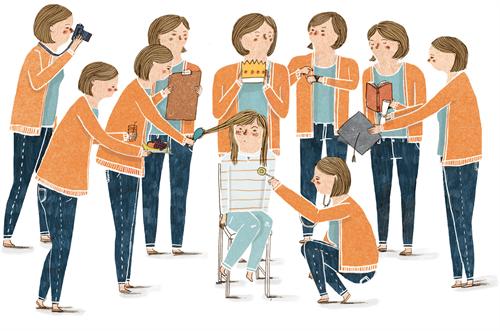7 Toxic Parenting Habits to Avoid (Backed by Child Psychology)

In modern families, many behavioral and psychological issues in children often stem from inappropriate parenting styles and a lack of healthy parent-child relationships. Most parents haven’t received professional training in child-rearing and often take on the challenging role of “parent” while lacking experience and struggling to manage their own emotions. Some parenting habits that seem harmless may, in fact, be quietly damaging a child’s psychological development.
1. Emotional Punishment: Using Silent Treatment or Verbal Shame
When children make mistakes, it's natural for parents to want to discipline them. However, punishment driven by anger—such as silent treatment or verbal attacks—can cause more harm than the mistake itself. Phrases like, “Why are you so stupid?” or “How did I end up with a child like you?” destroy a child’s self-esteem and gradually erode their sense of security and trust.
Particularly damaging is the “cold shoulder” approach, where parents ignore the child for an extended period. Though silent, this method can be deeply destructive.
Alternative Approach: Use Nonviolent Communication (NVC) to express your feelings and needs based on objective facts, and make clear requests:
- Observe the facts: “You’ve been on your phone for an hour,” instead of “You never listen.”
- Express feelings: “I feel anxious,” instead of “You make me so angry.”
- State needs: “I need to focus on my work right now.”
- Make requests: “Can we agree to put the phone down in 10 minutes?”
The goal of discipline is not control, but guidance. Meaningful communication leads to meaningful change.
2. Over-Control: Denying Children Autonomy and Choice
Many parents want their children to follow a “successful path” and therefore try to make all decisions for them—often projecting their unfulfilled dreams onto their children. This “I’m doing it for your own good” mindset can strip children of autonomy, foster dependency, and trigger rebellion, especially during adolescence.
Children are not extensions of their parents’ dreams. They are individuals with their own interests, pace, and life goals.
Suggestion: Allow your child the freedom to make their own decisions and discover their interests at their own rhythm. Encourage their individuality and be a supportive presence as they develop their unique abilities. Parents should act as guides, not controllers.
3. Ignoring Children’s Emotional Expression
Children aren’t naturally equipped with the ability to recognize and communicate their emotions—it’s a skill they need to learn over time. If parents routinely ignore or suppress their children’s emotional expressions, kids may learn to bottle up their feelings—leading to emotional disorders or emotional numbness later in life.
Suggestion: Teach children to recognize, accept, and verbalize their emotions. Use emotion validation to let them know, “Your feelings are understood and accepted.” This is a key step in developing emotional intelligence.
4. Achievement-Based Comparison Parenting
When parents place excessive emphasis on academic performance while neglecting overall development, children may base their self-worth entirely on external validation. A drop in grades can then lead to anxiety, self-doubt, or even depression.
According to psychologist Clayton Alderfer’s humanistic theory, children’s growth depends on fulfilling three core needs: existence, relationships, and growth. Academic performance is just one part of the growth journey—not its entirety.
Suggestion: Acknowledge your child’s strengths in non-academic areas—such as creativity, empathy, and responsibility. Help them develop a love for life and a sense of social responsibility, fostering stable self-esteem.
5. Doing Everything for the Child: Not Letting Them Make Mistakes
“I’ll do the dishes, you just focus on homework.” While such “over-caring” parenting may be well-intentioned, it deprives children of the opportunity to learn life skills and take responsibility.
Children grow through trying, failing, and adjusting. Doing everything for them weakens their sense of responsibility and efficacy, and can encourage a habit of blaming others.
Suggestion: Encourage hands-on learning and allow children to make mistakes within safe boundaries. Let them face natural consequences—e.g., if they forget a book, let them explain it to the teacher themselves instead of rushing it to school for them.
6. Overpraising or Empty Praise
“You're amazing!” or “You’re the smartest!”—when praise is vague or unearned, it can fail to boost intrinsic motivation. Instead, it may foster a false sense of superiority or lead to dependency on external validation.
Suggestion: Offer specific, realistic, and behavior-based praise. For example:
“You focused really well and finished the puzzle patiently. That shows great persistence.”
Such feedback builds authentic confidence and helps children understand which actions are valued.
7. Neglecting the “Repair” Phase in Parent-Child Conflict
After a conflict, many parents use silence or distance to deal with the issue, forgetting that emotional bonds need repair. Unresolved tension can cause children to develop insecure attachments, affecting future relationships.
Suggestion: After emotions have cooled, initiate a repair conversation with your child. Ask questions like:
“Why do you think Mommy got upset just now?”
“What could we do differently if this happens again?”
These conversations not only rebuild trust and safety but also enhance children’s problem-solving skills and emotional awareness.
There’s no such thing as a perfect parent—only parents who are willing to learn and grow. Parenting is a lifelong journey of self-improvement. Every moment of reflection and adjustment builds a stronger parent-child relationship and a healthier foundation for your child’s mental development.
Recommended Psychology Books for Parents:
1. “The Whole-Brain Child” by Daniel J. Siegel & Tina Payne Bryson
— Based on brain development, this book teaches how to communicate more effectively with children.
2. “How to Talk So Kids Will Listen & Listen So Kids Will Talk” by Adele Faber
— Practical communication strategies for various parent-child situations.
May every parent not only protect their child’s growth, but also evolve into a more emotionally mature version of themselves along the way.
Recommended for you:







